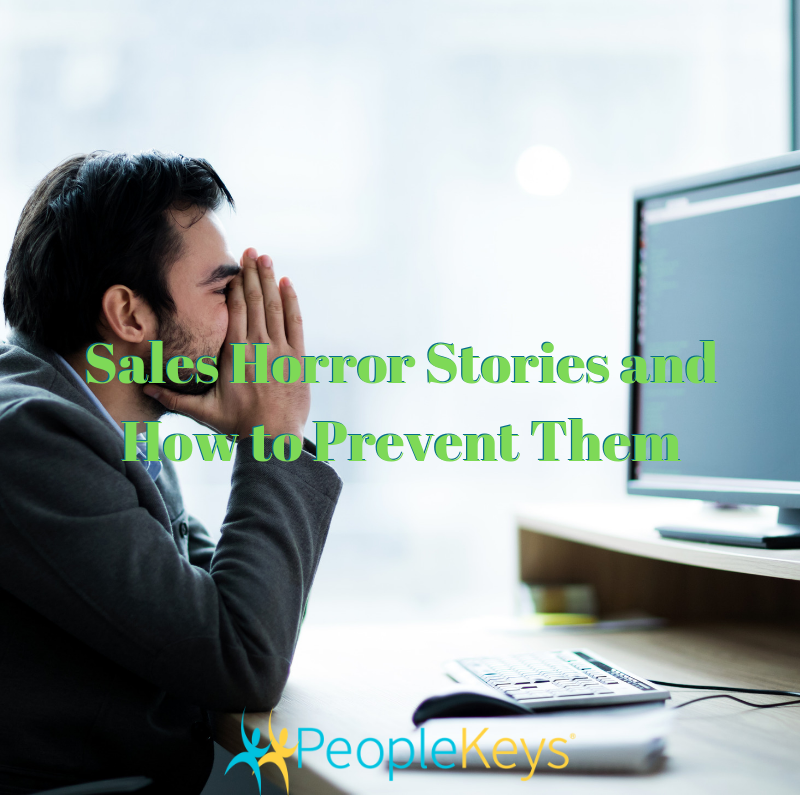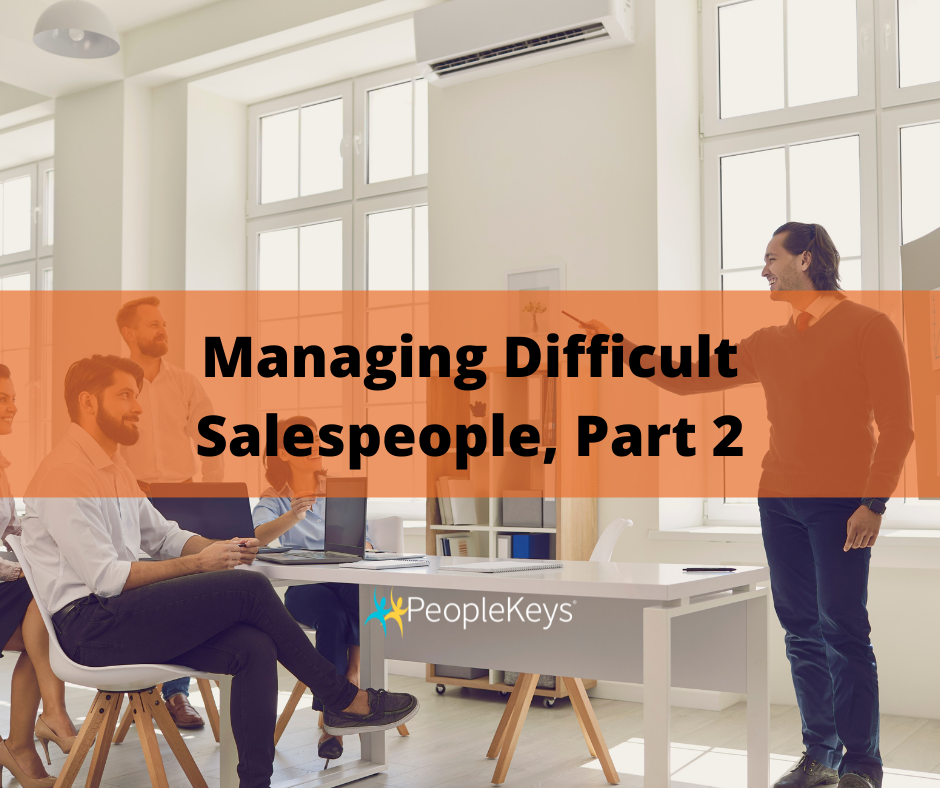
Sales Horror Stories and How to Prevent Them
The Problem
If you’ve ever met a salesperson whose personality didn’t fit with yours, you know how annoying the wrong approach to sales can be. Whether this person was looking to close the deal too soon, couldn’t answer your questions, or simply kept following you around when you said you didn’t need any help, the problem was always the same. This person was trying to sell without taking the customer’s personality into account.
The Solution
Let's share an example of sales "horror" story and then break down what went wrong. You’ll see how the salesperson could have used their knowledge about personality styles to avoid disaster.
The Story of the Too High "D" Salesperson and the "I" Customer:
I was looking to reserve a venue for my wedding, and I called this place to ask questions about how much it would cost. The guy who answered the phone put me on hold immediately, and kept me on the line while he barked at someone in the room. Strike one.
When he got back on the line, I started to tell him a little bit about how I wanted the wedding to look, so I could get a feel for if they were the place for us. We were looking to have one of the most important days of our lives at this place, so I wanted to know if they fit our style. He just said, “uh huh” in a rushed tone as I’m starting to talk, and then interrupted me to ask how many people we were planning on having.
I gave him a range, not a firm headcount(I didn’t have a firm headcount because of course no one had RSVP’d to a wedding that doesn’t have a date yet). He interrupted me again to tell me his venue is the best one in town for that size and I won’t find a better venue. He told me, "since you don’t know what you need,” because I didn't have a firm guest count, “you should just book this venue because it is the best.” Strike two.
He then spat a bunch of numbers at me, rapid fire. “It’ll be $5,000 if you want to have 25 guests stay at the hotel, $2,000 more if there will be more than that, but you seem like a nice girl, so I’ll just charge you $1,500. What is your email address? I’ll send you a contract.” Strike three.
Why was that strike three? He told me he would cut me a deal because I "seemed like a nice person," which I usually am, but he would have no way of knowing this since he hadn't let me talk for even a second. Phony. Also, I never agreed to anything, so why was he trying to get me to sign a contract already? Needless to say, I didn’t book this venue.
What went wrong?
1. The Salesperson Failed to Identify the Customer’s Personality Type
Plenty of things went wrong in this story. The first thing a salesperson should do when they are speaking to a client is try to figure out who they are. What brought them to you? What do they want, and why? How can you communicate with them effectively? The DISC personality system serves as a shorthand for this process (By the way, we have an entire course on how to do this).
Using your knowledge of personality styles to identify the client/customer gives you the key to speaking their language.
The customer in the story above has an "I" style personality. She wanted to have a relationship with this salesperson. She wanted to tell him about their wedding, and then have the venue’s representative promise her that they could make it happen. As an "I," she probably wanted to ask a few questions, nothing too specific, and get a feel for whether the venue would be a good fit. The salesperson was the opposite of what she was looking for. His totally non-transparent, condescending, and pushy approach was completely impersonal and insincere. She has a people-oriented personality, so she did not appreciate that.
2. The Salesperson Failed to Listen to the Customer
The customer was put on hold immediately, which is always bad etiquette if not necessary, and then forced to hear the salesperson yelling at a co-worker.
The "I" style personality is people-oriented and a peacemaker. Forcing her to listen to a conflict she cannot fix stressed her out, which is not conducive to spending money. It is more likely to get her to hang up the phone.
Also, the salesperson missed a great opportunity by interrupting her. The customer was going to volunteer information about herself and what she wants. But the salesperson just told her what he thought she wanted to hear, that his place was the best.
If he had given her a chance, she would have basically told him how to sell to her. He should have told her the story of how that venue meshed with her vision, and let her know that he and his team would be there to support her. He could send her links to pictures or invite her out for an on-site visit or tour so she could get a feel for the place, and envision the moment for herself. He could have told her his team would take care of everything so she could focus on making her event unique.
The salesperson was so concerned with making a sale that he lost track of what sales is really about -- relationships.
3. The Salesperson Failed to Speak the Customer's Language
Talking down to a customer by telling her directly that she “doesn't know what (she) needs” is just rude. But if this "D" style salesperson had been talking to a "D" style client, this might have been acceptable. The "D" style client might be reassured by hearing someone confidently proclaiming that this purchase was the best decision he could make. That’s what the "D" wants to know. But the "I" doesn’t care if the salesperson thinks it’s the best, she wanted to feel like it was right for her.
When the salesperson started throwing out a bunch of numbers, he risked losing the "I" style customer. Even if this salesperson hadn’t lost her up until now, he would have then. The "I" wanted a second to process the numbers, and wasn’t looking to collect and analyze them. She was looking for something that felt right, and that couldn’t be found by crunching digits. Sure, she would have wanted this information eventually, but he shouldn’t have started with it.
4. The Salesperson Gave Too Many Details Up Front to the Customer
Now, if this salesperson was talking to a "C" style customer this would be good to lead with. Give them the data right off the bat, and let them analyze, research, and compare this data with other places. The "C" style isn’t looking for a relationship; they just want the data so they can make an informed decision for themselves.
5. The Salesperson Failed to Exhibit Knowledge of Personality Styles
This salesperson didn’t make this sale, but he could have if he knew more about personality styles and matched his sales style to the style of his customer.
Of course, the question you are probably asking yourself is “how do I know what personality style my customer has?” And what exactly do I do once I have this information? We can help!
Check out the PeopleKeys sales style profile to learn how to sell more effectively based on personality style.






